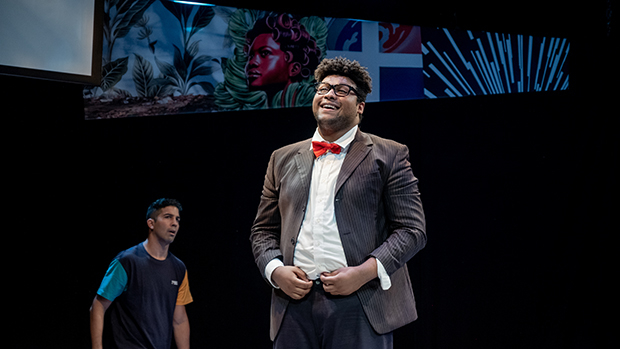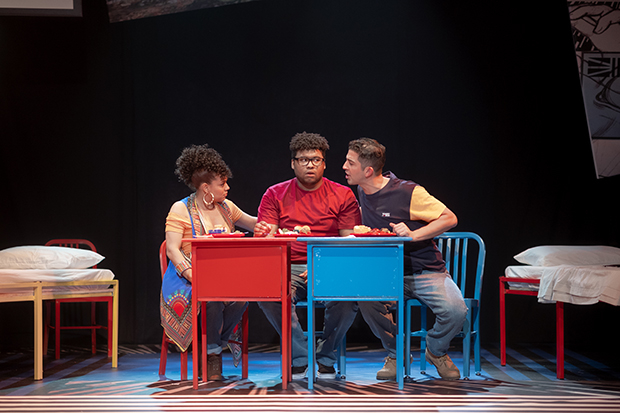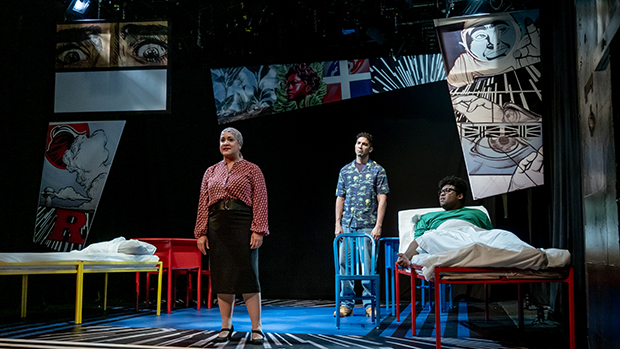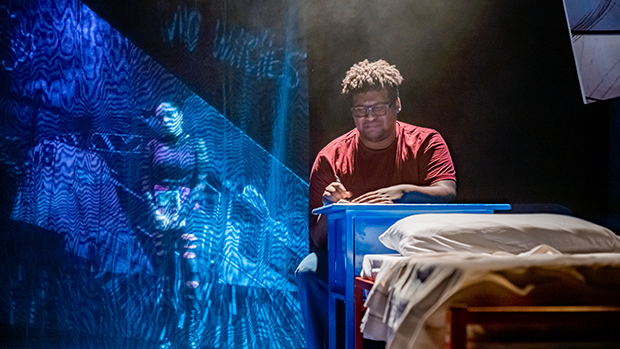The Brief Wondrous Life of Oscar Wao Becomes a New Spanish Play
Junot Díaz’s Pulitzer Prize-winning novel receives a world-premiere stage adaptation at Repertorio Español.

(© Michael Palma Mir)
Adapting a novel for the stage is hard. While the novelist is able to transcend time and place with the tap of the keyboard, the playwright faces a daunting list of limitations: production costs, cast size, and the four walls of the theater, to name a few. The best page-to-stage ventures thrive within those limits, reframing the story and deepening our understanding of the characters through live performance. The world-premiere Spanish-language adaptation of Junot Díaz's The Brief Wondrous Life of Oscar Wao, written and directed by Marco Antonio Rodríguez for Repertorio Español, achieves one of those feats.
It tells the story of Oscar de León (Edgar Sebastian), an overweight dark-skinned sci-fi geek from New Jersey who is convinced that he may end up the only Dominican male to ever die a virgin. His freshman-year roommate, Yunior (Mario Peguero), tries to teach him how to impress women, but Yunior seems more interested in Oscar's sister, Lola (Altagracia "ANova" Nova). Oscar is attracted to unavailable women like goth girl Jenni (Belange Rodríguez), who is in turn attracted to big scary men like Manny (Alfonso Rey). A total romantic, Oscar is convinced that he languishes under the dark shadow of fukú: an ancient curse from the old country that plagues his family. He travels back to the Dominican Republic to uncover a lost history known only by his mom (Maite Bonilla) and the woman who raised her, La Inca (Arisleyda Lombert).
In the novel, Díaz introduces us to the ways of fukú and the political context into which this family legend was born. Through extensive footnotes, he gives special attention to the 1930-61 reign of Dominican dictator Rafael Trujillo, a man who ruled his half of Hispaniola as a personal fiefdom, keeping the country poor, isolated, fearful, and easy to control. In such an environment, self-censorship is the most important skill one learns for survival. Those who refuse to learn can join the growing diaspora, into which inherited traumas still linger. Against this backdrop, Oscar's inability to suppress his personality is truly wondrous.

(© Michael Palma Mir)
But theater doesn't come with footnotes, and adapters must devise other ways to catch their audiences up to speed. Unfortunately, Rodríguez shirks this task for the entire first act, which takes the form of a fairly standard romantic comedy taking place entirely on the Rutgers University campus. Scenes go on entirely too long, and Oscar is relegated to the comic relief in his own story, pushed to the back burner by the sizzling courtship of Yunior and Lola (Peguero and Nova do indeed sizzle).
By the second act, Rodríguez seems to realize what kind of novel he's adapting, and does a much better job of bringing context to the stage. But it's too late, and we are left with a bottom-heavy play laden with late-arriving exposition. Neither Oscar's mom nor La Inca makes an appearance until Act 2, and the name Trujillo is not uttered until the 90-minute mark. A gorgeously staged flashback (Rodríguez's direction also becomes more rigorous in the second half) lets us know why Oscar's mom is the way she is — but we don't really have a strong sense of what that means, because we've only just met her. This process should have started from the very beginning, and the Nintendo-RPG-fantasy world that occupies Oscar's mind offers plenty of clever storytelling conventions that could have made that work.

(© Michael Palma Mir)
The backdrops in Melanie May's scenic design suggest the show that might have been: Comic drawings show a Dominican flag, a woman with her hair in curlers, and a nervous set of eyes (May's active set is much less effective, with too much space taken up by a pair of twin beds). Nathan Leigh's SNES-era sound effects aggressively introduce Oscar's fantasy world to the stage, while his well-selected underscoring transports us to the DR in the middle of the last century. Inés Zapata creates several stunning lighting effects, and Leni Méndez is able to differentiate the double-cast roles through specific costume design choices. The parts are all there, but they lack cohesive direction, resulting in jarring tonal shifts throughout.
The performers, who are uniformly excellent, work double duty to mitigate any confusion. Lombert is vital as La Inca, unveiling family lore in a tropical mist of holy water. Bonilla and Nova are formidable as mother and daughter, producing sparks with their friction. Belange Rodríguez has a smoky sexiness as both Jenni and Ybón, making Oscar's attraction to both women seem tragically fated. Everyone on this stage powerfully wields the language, the distinctively Dominican Spanish that can cut as well as caress (excellent work by dialect coach Yolanny Rodríguez).

(© Michael Palma Mir)
As our leading man, Sebastian delivers the most essential performance of the evening. His Oscar seems to wear every emotion on his face and in his slouch, a trait I initially (and wrongly) attributed to bad acting. But unlike Yunior (a closet geek who hides issues of Watchmen in his bag), Oscar is unable to act like anyone other than who he is — and that makes him a tragic hero: heroic because honesty is the greatest weapon against tyranny, but tragic because tyranny usually employs more lethal weapons in our fallen world.









